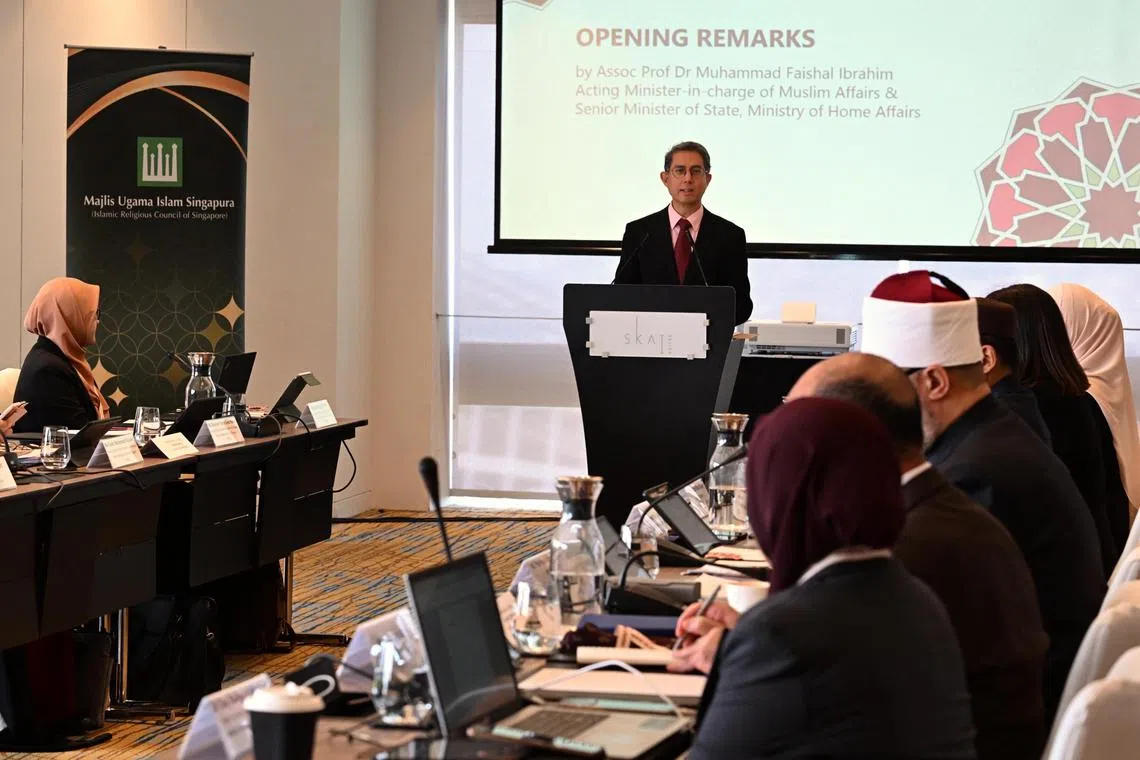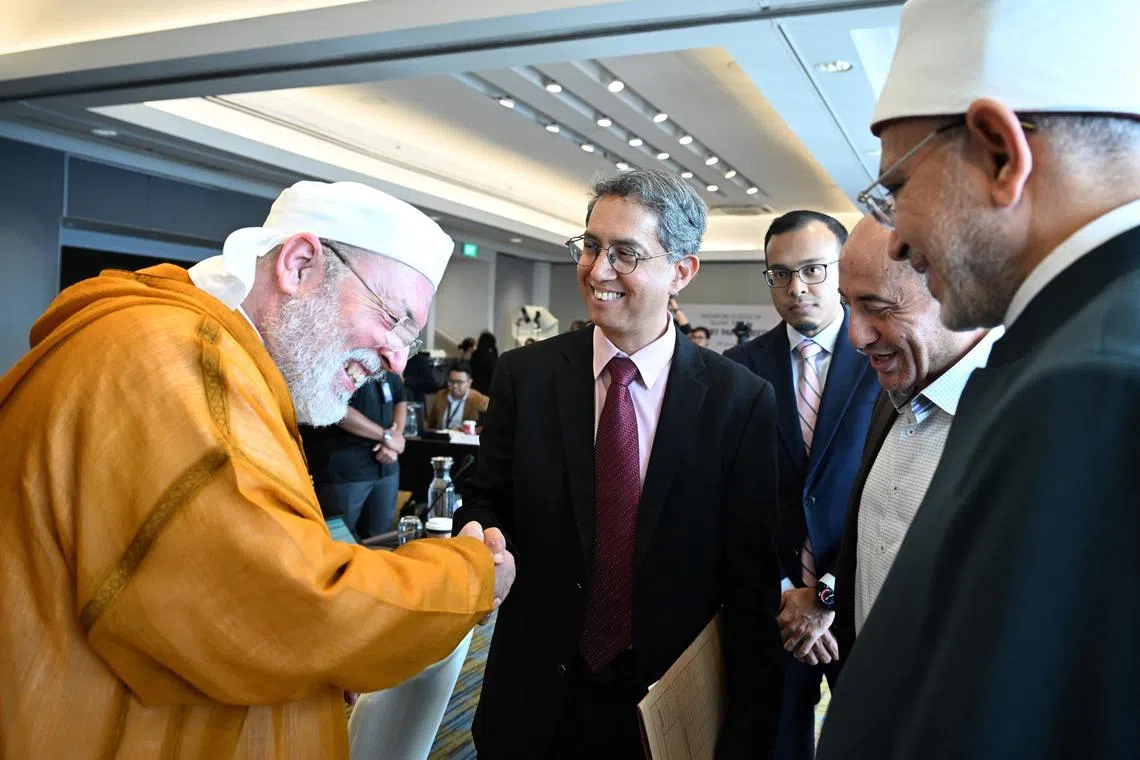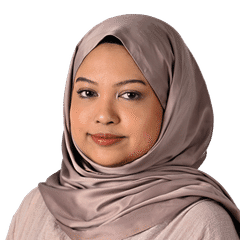S’pore asatizah must be able to guide the practice of Islam in modern societies: Faishal Ibrahim
Sign up now: Get ST's newsletters delivered to your inbox

Acting Minister-in-Charge of Muslim Affairs Faishal Ibrahim speaking at the inaugural meeting of the Singapore College of Islamic Studies advisory panel, which he chairs, on June 24.
ST PHOTO: CHONG JUN LIANG
SINGAPORE – It is important for Muslim religious teachers in Singapore to understand the principles of their faith, as well as the unique multiracial, multi-religious fabric of their society, said Acting Minister-in-charge of Muslim Affairs Faishal Ibrahim.
These teachers, known as asatizah, must be thought leaders who can effectively guide the practice of Islam in modern societies, uniting sound religious scholarship with contemporary needs, he added.
Associate Professor Faishal said such leadership is increasingly important, as evolving social norms and global interconnectedness have created complex problems that require fresh approaches to religious education.
“Our asatizah play a crucial role in this journey to provide guidance for the Muslim community in navigating these challenges,” he said.
Prof Faishal was speaking on June 24 at the first meeting of the advisory panel for the upcoming Singapore College of Islamic Studies (SCIS), which is expected to take in its first cohort of 60 students in 2028.
The meeting was held on the sidelines of the International Conference on Cohesive Societies, a three-day conference on multiculturalism.
Prof Faishal said the 10-member panel’s international perspective and scholarly insights will be invaluable in shaping SCIS’ research and academic programmes.
Panel members will help identify emerging global trends affecting Muslim communities. They will also shape the college’s research focus, educational standards and international collaborations, he added.
The panel is made up of international scholars such as the Grand Mufti of Egypt, Dr Nazir Mohamed Ayyad; Dr Salama Dawood, president of Al-Azhar University in Egypt; and Professor Driss Fassi Fihri, vice-president of Al-Qarawiyyin University in Morocco.
It is chaired by Prof Faishal, who took over the Muslim Affairs portfolio from Mr Masagos Zulkifli in May.
SCIS, which has been in the works for eight years, was formally announced in August 2024 during Prime Minister Lawrence Wong’s National Day Rally speech.
The Mufti of Singapore, Dr Nazirudin Mohd Nasir, who is also on the advisory panel, elaborated during the meeting on the importance of developing future religious leaders in Singapore.
He said Singapore’s asatizah who return from studying overseas have noticeable gaps in their ability to contextualise knowledge against the cultural diversity here.
There are programmes meant to bridge the gap – such as the postgraduate certificate in Islam in contemporary societies by the Islamic Religious Council of Singapore (Muis) – but one wonders whether this is the best approach, he added.
“We recognise a high degree of religious and spiritual interconnectedness and commonalities in the Islamic way of life between many Muslim communities, and that is why we have always been supportive of our students to study in renowned Islamic institutions,” he said.
“But we also acknowledge that there is an equally significant degree of uniqueness in our traditions and experience that needs serious attention.”

(From left) Al-Qarawiyyin University vice-president Driss Al-Fassi Al-Fihri, Acting Minister-in-Charge of Muslim Affairs Faishal Ibrahim, Muis deputy chief executive Khairul Anwar, translator Bouchaib Silm, and Grand Mufti of Egypt Nazir Mohammed Ayyad, before the start of the inaugural advisory panel meeting of the Singapore College of Islamic Studies on June 24.
ST PHOTO: CHONG JUN LIANG
If this difference is not carefully addressed in the way that Islam is studied and taught, it will become a big challenge in matters of religious leadership, Dr Nazirudin said.
“This will be one of the most major contributions of the college – to be able to find the right balance and to reduce divergence... and rework what normative Islam is where social context truly matters,” he added.
Ustazah Farah Aljunied, senior director of higher education and research at Muis, said another driving force behind the college is the evolving aspirations of students, who want broader career opportunities and more technology-enhanced learning.
Security concerns due to the volatile situation in some overseas study destinations have also led to increased interest in having a local option, she said.
Currently, more than 460 students from Singapore are pursuing tertiary Islamic education overseas. Close to 70 per cent are in schools in the Middle East and North Africa, in countries like Egypt, Jordan and Kuwait.
SCIS’ steering committee is currently looking into areas such as human resource management, corporate and academic governance, and curriculum development to firm up the set-up of the college, Ms Farah said.
After engagements with religious teachers, Ms Farah said senior asatizah have expressed support for the direction that the college is taking.
Around 50 per cent of madrasah leaders and teachers expressed interest in contributing to the college’s development through curriculum development, administrative matters and research, she added.
She said engagements with madrasah students also yielded excitement and support, with 76 per cent of students expressing trust in the college’s expertise.
Prof Faishal said: “Seeing this institution come to life means a lot to me and the community here in Singapore. It fulfils a longstanding community aspiration to have our own Islamic institute of higher learning, something we can all be proud of as Singaporeans.
“I’m very confident that we will be able to develop not only a unique institution with programmes that are contextualised to our setting, but also something that can value-add to what is available globally.”



